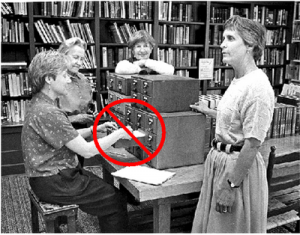Earlier this month I traveled to Milwaukee, WI to take part in a unique and timely symposium simply entitled “The Future of the Liberal Arts College Library.” The Council on Library and Information Resources (CLIR), in cooperation with the Council of Independent Colleges (CIC) organized this participant-driven, 2-day event in order to provide liberal arts librarians a venue at which to collaborate at and discuss, well …the future. No, we didn’t talk about librarian cyborgs equipped with decibel meter implants, ready and waiting to scold loud and unruly students with a perfectly compressed, digital “shhhhhhhhh!” Although, come to think of it, that would be pretty awesome. What we did talk about, however, was a wide range of issues pertaining to the “intersection of libraries and liberal arts colleges” both presently and in the foreseeable future.
At one session, “Cultivating the Value of ‘Place’ in the Small Academic Library,” we discussed ideas of how to best ensure that the library continues to be a unique destination and learning environment on campus. While many (myself included) were quick to evoke romantic images of the classic library reading room as the idyllic milieu for nurturing academic engagement and inquiry, it was acknowledged that modern libraries must be more versatile and innovative in regards to their utilization of space. Besides, who can really read while stooped over a long, dimly lit, wooden table? I’m sure Hope students could, but do they want to? It is critical to note that within the context of today’s information environment, concepts of “destination” and “place” no longer refer only to the the library’s physical building but also its web presence and the unique resources that create the virtual library experience.
Perhaps my favorite session was one called “Beyond the Research Paper: Supporting Undergraduate Research in the Library.” Here, we discussed the various research opportunities and experiences available at our institutions and how the library is, or could/should be, getting involved. I was happy to report to the group that here at Hope, the library is currently developing its “Digital Commons” to promote both faculty and student scholarship. Other ways in which libraries represented at this session are supporting undergraduate research include: publishing a student journal, assisting in the organization and promotion of an annual research celebration, and presenting an award for best use of library collections and resources. I served as the official “recorder” for this session and am currently in the process of writing an executive summary to submit to CLIR.
I was not able to make it to every session, but others that piqued my interest were: “The Small Academic Library and Globalization / Internationalization Initiatives,” “Librarians Leading in the Campus Community,” “Marketing the Small Academic Library,” and “Distance Learning for Small Colleges.” I will look forward to reading the summaries of these once they become available.
One of the sessions was really more of a workshop than a discussion. It was called “Getting to Know Your Library Users,” led by Andrew Asher, lead anthropologist from the groundbreaking Ethnographic Research in Illinois Academic Libraries (ERIAL) Project. He explained the various qualitative research methods his team employed over the course of two years at five different universities in attempt to obtain a “holistic portrait of students’ research practices and academic assignments.” The workshop was intended to serve as a primer on this type of research and to encourage librarians to consider studying their own students’ research habits and information seeking behavior using some of these same techniques.
 When discussing the future of just about anything, it is only natural to feel a bit uncertain or uneasy about where things could be headed. I was, however, very pleased to see the optimism and excitement expressed by my colleagues from around the country in regards to the many changes already happening in our field and how libraries are planning for whatever is next. Oh, and in case you were wondering… After spending a few days looking into the future of the liberal arts college library, I can assure you that the card catalogue is not making a comeback anytime soon.
When discussing the future of just about anything, it is only natural to feel a bit uncertain or uneasy about where things could be headed. I was, however, very pleased to see the optimism and excitement expressed by my colleagues from around the country in regards to the many changes already happening in our field and how libraries are planning for whatever is next. Oh, and in case you were wondering… After spending a few days looking into the future of the liberal arts college library, I can assure you that the card catalogue is not making a comeback anytime soon.
— Todd Wiebe, Research and Instruction Librarian

